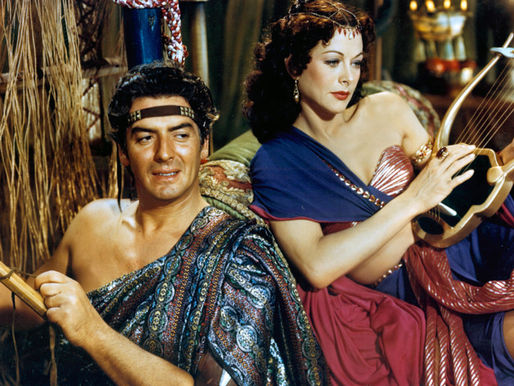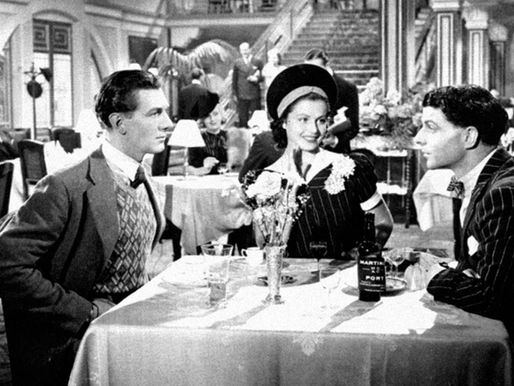top of page
Search
Drama
Classic Drama Films from 1930 - 1999


The Slender Thread (1965)
The Slender Thread is a poignant, tightly wound psychological drama that explores human despair, responsibility, and the tenuous connections that can hold a life together. Directed by Sydney Pollack in his feature debut, the film is based on a true story originally published in Life magazine, dramatizing a suicide prevention hotline worker’s desperate attempt to save a woman’s life through a telephone call.

Soames Inscker
4 min read


Advise and Consent (1962)
Advise & Consent (1962) is a tense, cerebral, and surprisingly daring political drama directed by Otto Preminger, adapted from Allen Drury’s Pulitzer Prize-winning novel of the same name. It offers a razor-sharp look at the inner workings of the United States Senate and the murky interplay of politics, personal secrets, ideology, and power.

Soames Inscker
4 min read


Anatomy of a Murder (1959)
Anatomy of a Murder is not only one of the most enduring courtroom dramas ever filmed, but also a prime example of how cinema in the late 1950s was evolving—pushing boundaries, addressing adult themes, and striving for psychological realism. Directed by Otto Preminger and based on a best-selling novel by Michigan Supreme Court Justice John D. Voelker, the film combines taut legal suspense with rich character study, anchored by a career-highlight performance from James Stewart

Soames Inscker
4 min read


The Man With The Golden Arm (1955)
The Man with the Golden Arm is not only a landmark film in the career of Frank Sinatra but also a pivotal moment in American cinema’s confrontation with taboo subject matter. Directed by Otto Preminger and adapted from Nelson Algren’s gritty 1949 novel, the film centres on drug addiction—an explosive topic that the Production Code Administration had long deemed unfilmable.

Soames Inscker
4 min read


Laura (1944)
Laura (1944) is one of the most celebrated films of the film noir genre, a hauntingly elegant blend of romance, mystery, and psychological complexity. Directed by Otto Preminger and adapted from Vera Caspary’s novel, Laura stands as one of the defining examples of mid-20th-century Hollywood's engagement with darker, morally ambiguous storytelling. It is a film that combines exquisite cinematography, striking performances, and a narrative steeped in mystery and intrigue.

Soames Inscker
7 min read


Samson and Delilah (1949)
Samson and Delilah (1949), directed by the legendary Cecil B. DeMille, is a grandiose spectacle of biblical proportions that combines larger-than-life action, dramatic storytelling, and lavish Technicolor cinematography to create a timeless epic.

Soames Inscker
6 min read


My Son John (1952)
My Son John (1952) is an American film that brings the political tensions of the early Cold War era directly into the domestic sphere. Directed by Leo McCarey, a filmmaker known for both his comedy and dramatic sensibilities, the film tackles the sensitive subject of communism, its threat to American values, and the personal cost of ideological betrayal.

Soames Inscker
6 min read


Going My Way (1944)
Released during the final years of World War II, Going My Way (1944) is a classic example of a film that blends humour, sentimentality, and musicality to create a lasting emotional impact.

Soames Inscker
6 min read


Make Way For Tomorrow (1937)
Make Way for Tomorrow (1937) is a heart-wrenching, bittersweet exploration of aging, family dynamics, and the often unspoken emotional struggles that come with growing old.

Soames Inscker
6 min read


Ruggles of Red Gap (1935)
Ruggles of Red Gap (1935) is a charming and whimsical comedy that represents a delightful intersection of British and American sensibilities in film during the mid-1930s.

Soames Inscker
6 min read


Outcast of the Islands (1951)
Outcast of the Islands (1951) is a richly layered drama set in the remote, tropical environment of the Malay Archipelago, adapted from Joseph Conrad's novel of the same name.

Soames Inscker
6 min read


The Man Between (1953)
The Man Between (1953) is a striking example of British post-war cinema, mixing elements of noir, suspense, and Cold War tension. Directed by Carol Reed, known for his mastery of atmospheric tension in films like The Third Man (1949), this film explores themes of espionage, political intrigue, and moral ambiguity in the divided city of Berlin during the early years of the Cold War.

Soames Inscker
6 min read


The Fallen Idol (1948)
The Fallen Idol (1948) is a quiet masterpiece of psychological tension, moral ambiguity, and childhood perception. Directed by Carol Reed in one of his finest collaborations with writer Graham Greene (preceding their celebrated The Third Man), the film is a study in how innocence and misunderstanding can transform the banal into the tragic.

Soames Inscker
5 min read


The Stars Look Down (1940)
The Stars Look Down (1940) is a compelling, socially conscious British drama that grapples with class conflict, industrial exploitation, and moral idealism.

Soames Inscker
5 min read


Odd Man Out (1947)
Odd Man Out is a remarkable film that defies easy classification—part noir, part political thriller, part poetic tragedy. Directed by Carol Reed, it was his first major success before The Fallen Idol (1948) and The Third Man (1949), and in many ways laid the stylistic and thematic groundwork for those later masterpieces.

Soames Inscker
5 min read


The Young Mr Pitt (1942)
Released during the darkest years of World War II, The Young Mr. Pitt is a patriotic historical drama that draws a resonant parallel between Britain's 18th-century struggle against Napoleon Bonaparte and its 20th-century fight against Adolf Hitler.

Soames Inscker
5 min read


The Way Ahead (1944)
Released in 1944, as World War II continued to engulf Europe, The Way Ahead stands as a poignant example of wartime British cinema—simultaneously a morale booster, a subtle piece of propaganda, and a genuinely moving character drama.

Soames Inscker
4 min read


Night Train To Munich (1940)
In the fraught lead-up to World War II, British cinema responded to rising geopolitical tensions with a wave of clever, patriotic, and suspenseful thrillers. Night Train to Munich (1940), directed by Carol Reed, is a standout in this cycle.

Soames Inscker
4 min read


Trapeze (1956)
Carol Reed’s Trapeze (1956) is a lush, emotionally layered drama set against the dazzling backdrop of a Parisian circus. Beneath the sequins, the tented glamour, and death-defying aerial stunts lies a story about ambition, desire, loyalty, and human frailty.

Soames Inscker
4 min read


Oliver (1968)
Carol Reed’s Oliver! is a sweeping, emotionally resonant musical adaptation of Lionel Bart’s 1960 West End production, which itself reimagines Charles Dickens’ seminal 1838 novel Oliver Twist.

Soames Inscker
4 min read
bottom of page


